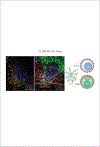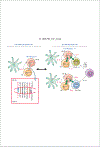Dysregulation of T Follicular Helper Cells in Lupus
- PMID: 30833421
- PMCID: PMC6402788
- DOI: 10.4049/jimmunol.1801150
Dysregulation of T Follicular Helper Cells in Lupus
Abstract
Although multiple and overlapping mechanisms are ultimately responsible for the immunopathology observed in patients with systemic lupus erythematosus, autoreactive Abs secreted by autoreactive plasma cells (PCs) are considered to play a critical role in disease progression and immunopathology. Given that PCs derive from the germinal centers (GC), long-term dysregulated GC reactions are often associated with the development of spontaneous autoantibody responses and immunopathology in systemic lupus erythematosus patients. In this review, we summarize the emerging evidence concerning the roles of T follicular helper cells in regulating pathogenic GC and autoreactive PC responses in lupus.
Copyright © 2019 by The American Association of Immunologists, Inc.
Figures



References
-
- Harley JB, Sestak AL, Willis LG, Fu SM, Hansen JA, and Reichlin M. 1989. A model for disease heterogeneity in systemic lupus erythematosus. Relationships between histocompatibility antigens, autoantibodies, and lymphopenia or renal disease. Arthritis Rheum 32: 826–836. - PubMed
-
- Woodroffe AJ, Border WA, Theofilopoulos AN, Gotze O, Glassock RJ, Dixon FJ, and Wilson CB. 1977. Detection of circulating immune complexes in patients with glomerulonephritis. Kidney Int 12: 268–278. - PubMed
-
- Greisman SG, Redecha PB, Kimberly RP, and Christian CL. 1987. Differences among immune complexes: association of C1q in SLE immune complexes with renal disease. J Immunol 138: 739–745. - PubMed
Publication types
MeSH terms
Substances
Grants and funding
LinkOut - more resources
Full Text Sources
Medical
Miscellaneous

